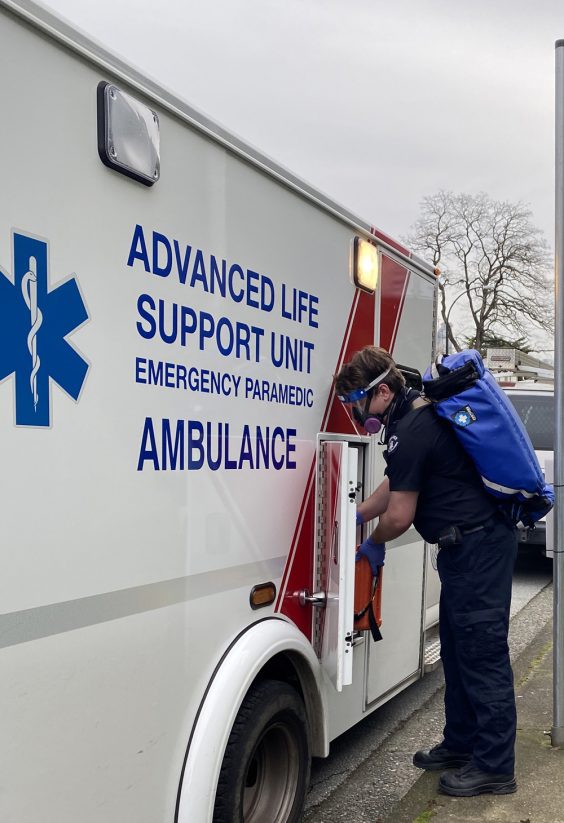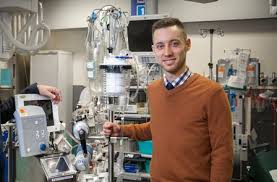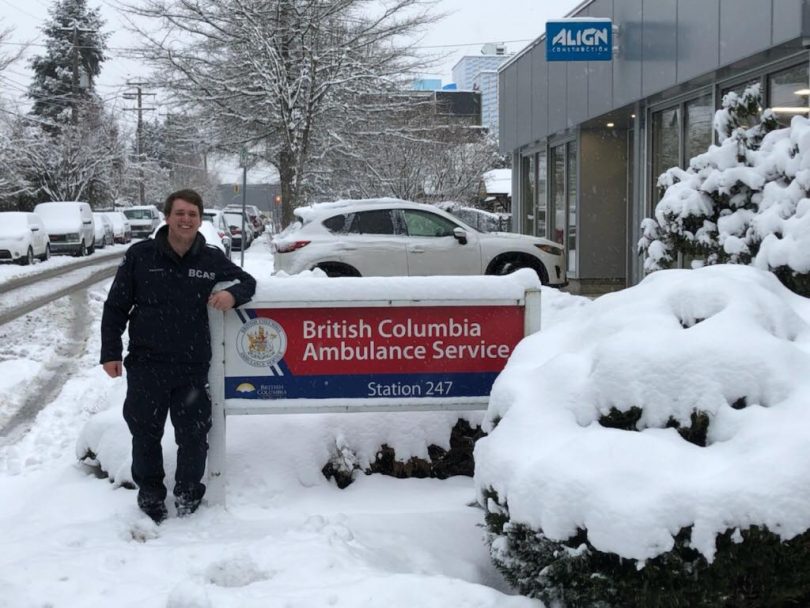With more than 30 years on the job, paramedic specialist Brian Twaites has seen just about everything – the HIV/AIDS crisis, SARS, and the ongoing opioid crisis. But 11 months ago, just as COVID-19 was ramping up, he remembers one particular night that marked a turning point for him: “The streets were getting empty, every call we went to there was now this extra step of donning and doffing PPE [personal protective equipment]. It was a surreal moment with the realization that we were living in a pandemic.”
His colleague Richard Armour recalls looking out the window of his home in downtown Vancouver, normally bustling with traffic. “There were no cars anywhere. All of a sudden, there was nobody.”
Paramedics face constant COVID-19 exposure threats
At work, the two, along with their colleagues, were suddenly plunged into a new and uncertain world. Twaites says it was extremely taxing for everyone. “Paramedics face the constant threat of exposure because of our many interactions with people. We are in the hospital setting, we may be in an ICU or COVID ward, the emergency room, we are going into long-term care facilities, and we go into people’s homes. Sometimes you don’t know until you arrive at a call that someone in the house was isolating.”
The higher risk of exposure also changed things at home for these first responders. “There were no more hugs at the door,” says Armour. Instead, it was uniform straight into the washing machine, and then straight into the shower. After every shift.”
Study will check participants for antibodies

Paramedic Richard Armour
Neither believes they have been infected with SARS-CoV-2, as far as they know. But that is one of the reasons both are eager to take part in a new national study examining how the pandemic has impacted paramedics. They will be checked for antibodies to the virus as part of the study.
Led by Dr. Brian Grunau, an Emergency Department physician at St. Paul’s and a scientist at the Centre for Health Evaluation and Outcome Sciences (CHEOS), and Dr. David Goldfarb, a clinical associate professor in UBC’s faculty of medicine and a medical microbiologist and infectious disease specialist at BC Children’s Hospital, the goal is to identify workplace factors that increase or decrease the risk of infection. Ultimately, the information will be used to inform guidelines to protect paramedics’ health.
Some 3000 BC emergency responders to be part of study

“Paramedics play an integral role in our health system by providing life-saving pre-hospital medical care,” says Dr. Grunau, who is also the Research Medical Consultant for BC Emergency Health Services. “As the care environment of a paramedic can put them at a very high risk for COVID-19, this research will allow us to make evidence-based decisions to protect their health.”
Dr. Grunau and his team are recruiting up to 3000 paramedics and emergency medical responders from across BC who will complete surveys and give blood samples three times over one year. Another 2,500 paramedics will be recruited in Ontario. The researchers aim to determine how many paramedics have developed antibodies to the virus that causes COVID-19 and how long these antibodies last, as well as understand the workplace factors related to COVID-19.
Armour points out that the depth of knowledge specific to paramedics is growing, but still limited when compared to research in hospital environments. He says you can’t assess the true risk level to paramedics using non-specific data. “Our working environment is quite different, and the back of the ambulance is a very small place,” says Armour. “We can be literally 30 centimetres away from a patient’s face when we are carrying them on a stretcher or chair. But perhaps we have a protective factor because of the time we spend outdoors with patients.”
High emotional stress
Paramedics are among the first group to receive the COVID-19 vaccine in Canada, and the study will track the paramedics’ immune response to the vaccine. Twaites is eager to see how that unfolds, “It’s going to give us some answers and let me know how protected I am. We are all looking for some stability, and this study is going to help.”
“We launched this study because there was very little evidence to inform paramedic practice with regards to COVID-19,” says Dr. Grunau. “The emotional stress of working during the pandemic has had a significant impact on emergency medical staff, including paramedics. We aim to learn as much as we can about paramedics during the pandemic to help keep them safe.”
———-
To participate in the study or to learn more, go to omc.ohri.ca/CORSIP/. Paramedics who are already vaccinated are still invited to participate!
This project is funded by the COVID-19 Immunity Task Force, as part of a national effort by the Government of Canada to track spread of the virus in priority populations in Canada.





